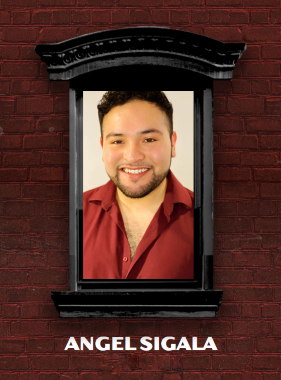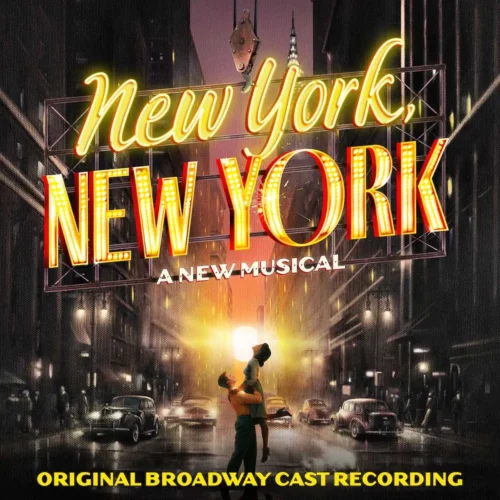AN ANGEL IN NEW YORK,
AND NEW YORK, NEW YORK
Angel Sigala was born and raised near Mexico City. His parents moved the family to the U.S. when he was ten years old, and he quickly dove into learning English. Eight years later, he attended Temple University and majored in Theater, Film and Media Arts, graduating in 2018. He remained in Philadelphia and performed at many area theaters: InterAct Theatre Company, People’s Light, the Arden Theatre, Theatre Exile, and in NJ at Axelrod Performing Arts Center.
After seeing an online audition post for a Cuban character in an upcoming Broadway musical, he took it as a good sign when a former high school teacher also sent him the same post. Turns out it was for the new Broadway musical New York, New York by Kander and Ebb, directed and choreographed by Susan Stroman, with additional lyrics by Lin-Manuel Miranda, and written by David Thompson and Sharon Washington. They had been creating the piece since 2018 minus the time off during the pandemic. In the last week of November 2022, Angel sent in his headshot and resume to be considered for the character of Mateo Diaz. Later that day, he received a request for a self-tape. After a couple days, he was invited to audition in person: a dance call, a singing call, and the next day, singing and reading, whereupon he was offered the role in person. He described the two days as “a very warm experience, feeling peaceful, calm, and at home.” Rehearsals began shortly thereafter on January 6, and after weeks of rehearsal, followed by tech and dress, Angel made his Broadway debut on March 24, 2023, and Stage and Cinema called him “charming” in our review. Now, the show has been nominated for 9 Tony Awards, including “Best Musical.”
Stage and Cinema’s Gregory Fletcher spoke with Angel at a lunch break during the recording of the original cast album, due out digitally on June 9th, and in hard copy around the start of 2024. Unlike many cast recordings, the album features the show’s complete score, comprising 90 minutes of music, including orchestral interludes.
GREGORY FLETCHER: Congratulations on such a wonderful, uplifting Broadway debut. As if it’s not enough pressure rehearsing your first Broadway production, you also had the additional stress of moving here from Philadelphia. In which neighborhood did you settle down?
ANGEL SIGALA: My partner, Joel Castro, and I found an apartment in Harlem.
Angel Sigala in Aida at Axelrod Performing Arts Center
FLETCHER: What are your first impressions of Harlem and NYC in general? Is it a big change from your former home?
SIGALA: It certainly is a big change, but something that feels quite beautiful. The culture and history in Harlem are stunning, and being able to be so close to midtown where I work is great.
Angel Sigala recording the New York, New York OBC
FLETCHER: In rehearsals and previews of New York, New York, were there many changes made?
SIGALA: Our creative team worked hard to trim down as much as possible, so we could deliver a show that’s around two and a half hours. One of the biggest changes from an earlier draft was the ending that jumped to 2023, where we saw a modern-day Francine Evans, Jimmy Doyle, and the rest of us characters, walking through our lives in New York City, Times Square, and seeing where that feeling of hope had taken us.
FLETCHER: How interesting. That’s a big jump from 1947. I’m guessing many of those characters wouldn’t be alive. What was Mateo Diaz up to then?
SIGALA: He was a club owner. But eventually, it was decided to end the musical in 1947. Susan Stroman put it best when she said it felt really poetic in the rehearsal room, but it didn’t necessarily work onstage.
The Company of New York, New York, with Angel Sigala on congas (Paul Kolnick)
FLETCHER: The belt on your jumpsuit sometimes looked like a sash to me, and from how you danced with the fabric, embracing the feminine side of your being, I wondered if your character was non-binary. Or was that my own modern projecting?
SIGALA: Not having that vocabulary in 1946-47, I’m not sure he could’ve made those choices. Certainly, in 2023, Mateo could identify as non-binary or genderqueer. But back then, I think he would be able to identify within the queer community, truly living their own life, but I doubt he would be open and out about it.
John Kander, Angel Sigala, Lin-Manuel Miranda (Susan Stroman)
FLETCHER: I noticed in the Playbill you identify with the pronouns “he, him, él,” but I noticed post-show when you were graciously signing autographs and taking photos with your fans, you wore a lovely pearl necklace and appeared non-binary. It must feel meaningful to get to live the modern version of Mateo and those who didn’t get to live their authentic self in prior generations.
SIGALA: That’s a beautiful thing, I think. And you know, in truth, I haven’t fully landed on where I stand in the gender spectrum. But I think it’s such a beautiful thing to be able to feel empowered in my ability to express myself. Whenever I introduce myself and state my pronouns, as of now, I say “he and they.” It’s something I’m in communication about with my loved ones. But “he/they” sounds really nice to me, but it’s something that has been fairly new and reminiscent in my spirit.
The Company of New York, New York (Paul Kolnick)
FLETCHER: Tell me about growing up in Mexico. Were you involved in the arts during those first ten years?
SIGALA: I was raised near Mexico City, in a little town called Coyotepec. I started in the arts by dancing Mexican folklore and loved it.
FLETCHER: What brought your family to the U.S. and where did they settle?
SIGALA: Economic opportunity for sure; my parents wanted a brighter future for both me and my sister. Moving to the U.S. involved a lot of culture shock. So, the story and the feeling of Mateo just arriving and finding his way was something I could connect to. I lived the immigrant story and the immigrant struggle. The only difference was his being Cuban. But we share a lot of values and cultural similarities. As part of my research, I dove into the Cuban culture in order to portray Mateo with dignity and respect. I honed the Cuban accent because the dialect of Cuban Spanish is different from my Mexican dialect. I was very lucky to have Janet Dacal who plays my mother. She’s Cuban and I listened to her talk about her family, experience, and her Spanish. She was a very helpful source for me. Plus Claudia Mulet — who worked with Stro and her team — is Cuban, so I often recorded her with words I needed. Cuban Spanish is very quick. Also, New York City offered me the chance to dive into Cuban culture and food. There’s a rich Cuban community with many businesses here.
Janet Dacal, Angel Sigala (Paul Kolnik)
FLETCHER: Your Mateo feels authentic and, frankly, a breath of fresh air with an intoxicating flair of passion. You play the drums during several musical numbers. Was that a talent you already possessed?
SIGALA: I did not play the congas or the bongos. I learned all the techniques needed through Victor Pablo, [drummer and percussionist in the band of New York, New York], who taught me lessons during rehearsals, followed by a lot of practice on my own. But my background in Mexican folklore was very percussive. The Cuban rhythm and percussive feel really translated very well. I understood the rhythms, which were not too hard to learn. But I definitely had help, and I’m so grateful to Victor for sharing his talents.
Angel Sigala & Oliver Prose (Paul Kolnick)
FLETCHER: Regional theater usually performs five to seven performances a week and closes after two or three months. That’s very different from eight performances a week, one week following the next. And I’m guessing this production will run for years because it’s so entertaining, so well-designed, -staged, and -choreographed, and an absolute love letter to NYC. Certainly, it deserves to run a good long time. Are you anticipating some self-care you’ll need to do for yourself in order to survive a long run?
SIGALA: I’m actually learning from the Broadway veterans in the show, like Emily Skinner, Janet Dacal, and Ben Davis (pictured below), lots of award-winning pros. Just learning from them about the little things they do to start their day and get through the week, physically, emotionally, and spiritually. Broadway is not easy, and it demands commitment and a lot of sacrifices that you have to make physically.
Richard Gatta, Ben Davis, Anna Uzele, Wendi Bergamini, Giovanni Bonaventura, Kristine Covillo (Paul Kolnik)
FLETCHER: Where do you envision yourself within the next few years?
SIGALA: I’d like to stay with the show for a year or two, but I also want to explore TV and film. This is something that’s been inside me just as much as Broadway. I’m really excited about future opportunities with roles that are more contemporary, that expand on the experience and human culture of being queer in this time. I’m very curious and excited about new work that is coming to either Broadway or to TV and film.
FLETCHER: I bet this fabulous Broadway experience will help you get your TV and film opportunities that much more quickly. I can’t wait to see where this launching pad sends you soaring.
The Company of New York, New York (Paul Kolnick)
find Angel Sigala at Instagram
find Gregory Fletcher at Gregory Fletcher Facebook and Instagram



